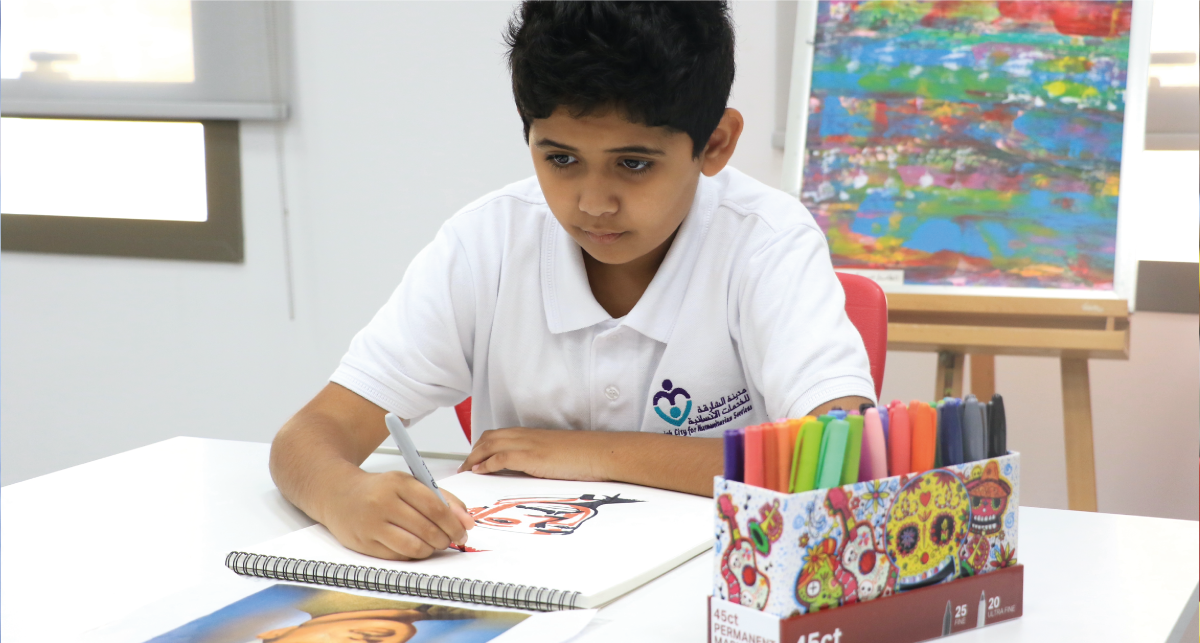Sharjah City for Humanitarian Services was the first to introduce a specialized service for people with an autism spectrum disorder in the United Arab Emirates in the 1994-1995 academic year by establishing a department connected to the Institute of Intellectual Development (formerly).
In February of the year 2002, the Sharjah Autism Center was established and opened as the first specialized Emirati center that provides specialized educational and therapeutic services suitable for students with autism spectrum disorder and their families.
The center includes a special section for young people with autism spectrum disorder, which was opened in 2007 to continue to develop and expand services and extend their scope to include adolescents and young people with an autism spectrum disorder.
Acceptance of students in the Sharjah Autism Center starts from the age of the student from 5 years until the age of 15 years
- Educational classes from 5 to 12 years old.
- Professional preparation from the age of 12 to 18 years.
Sharjah Autism Center provides services for people with Autism Spectrum Disorder (ASD)
The most important basic services provided:
Educational Psychological Assessment
Students enrolled in the center are evaluated through assessment tests accompanying the curriculum, including:
- (Psychological-educational file 3rd Edition - Arabized version (PEP-3) and evaluation scale (PEP-R) for the age group up to 10 years
- The TTAP scale is for ages 12 and up.
Family Support and Guidance
The center provides family support and counseling services to families, and training on the methods and mechanisms of dealing with children with an autism spectrum disorder.
The family in the Teach program is an essential partner in the work team and continues the application of techniques with the student at home and in the community.
Support and Therapy Services
- Skills development.
- Music therapy.
- Auditory training.
- Sports.
- Housekeeping.
- Handicrafts.
- Art education.
- Computer.
- Quran and Intonation.
- Nursing services.
Assistive Technologies Service
By evaluating students needs and providing them with appropriate tools and applications to support their learning and communication process.
Educational Inclusion Services
The Center seeks to provide opportunities for academic integration for some cases in regular schools and to follow up on the inclusion process.
Counseling and follow-up Service
Includes (individual or group counseling, student follow-up and transitional plans)..
Community awareness of autism spectrum disorder
Organizing and participating in exhibitions, conferences, lectures, and allocating visits to schools, universities, and various entities.
Inclusion of the centers students into the outside community through various outside activities.
Youth Department Services
It is a section dedicated to youth from 12 years old to 16 years old, and aims to enhance students abilities to communicate, be independent, develop hobbies and fill free time.
Which contributes to improving their social and interactive skills, in addition to training on some workshops and professional works..
The Sharjah Autism Center provides its services to people with autism spectrum disorder, following the (TEACCH) approach.
Treatment and Education of Autistic and Related Communication Handicapped Children.
Mechanism of registration
The registration process is carried out in the center by an arranged mechanism.
- In the beginning, the initial registration process is done by phone or by visiting the center in coordination with the receptionist or social service employee.
- After that, the center contacts the family, schedules an appointment for the initial survey, and brings the medical report and identification papers.
- Then the family is contacted for the second time for official registration and interviews with specialists for evaluation according to the child's need.
- After that, the center contacts the family to hand over the child’s report after completing the comprehensive assessment process, and they are informed of the services that will be provided to the child (family counseling, classes, communication, physical therapy), taking into account the date of the child’s registration and waiting lists.



